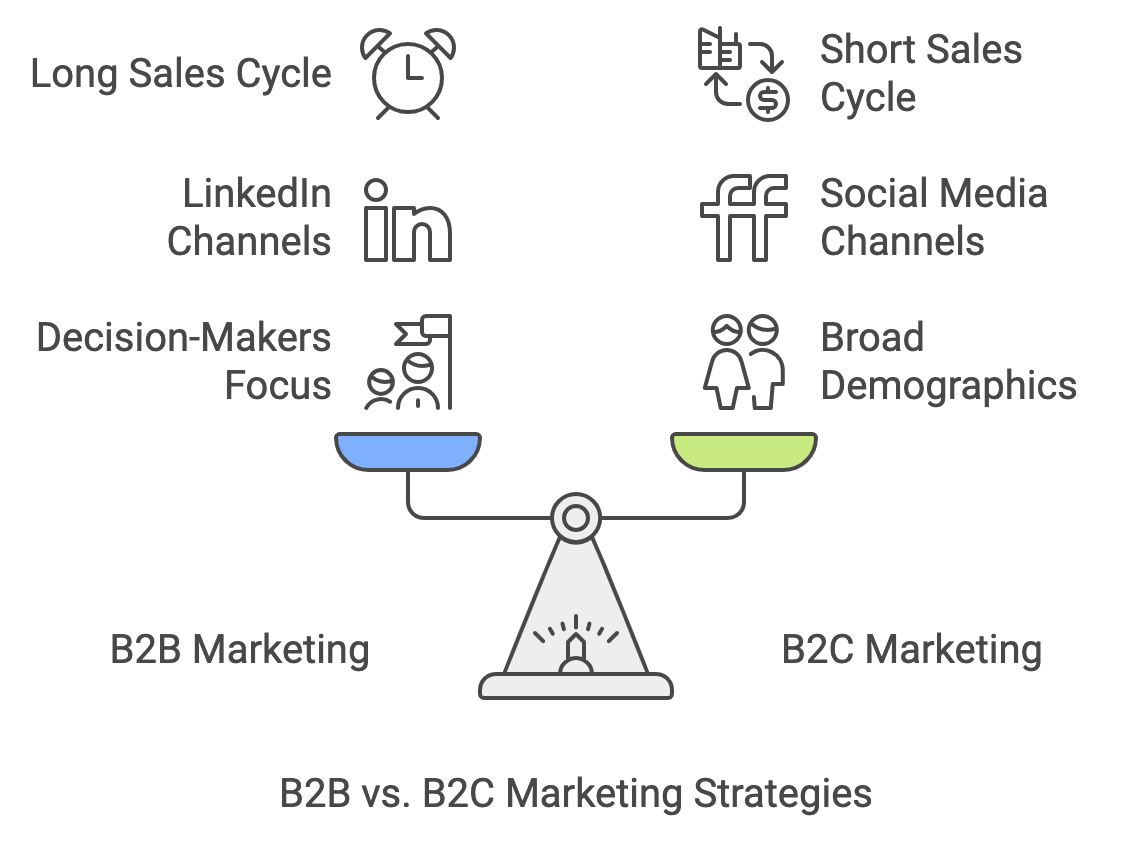5 Key Differences Between B2B and B2C Digital Marketing (FREE "B2B/B2C Marketing Spend Calculator" Inside!)
By: Hayden Jarman

When it comes to digital marketing, the strategies for reaching businesses (B2B) are very different from those aimed at consumers (B2C).
Whether you’re selling to decision-makers at large corporations or targeting the everyday shopper, understanding the unique dynamics of each approach is crucial.
Let’s break down the five key differences between B2B and B2C marketing—and how you can leverage each to maximize your results.
📊 B2B/B2C Marketing Spend Calculator 💡
Make the most of your marketing budget today!
Table of Contents:
- 1. Audience Targeting: The Science Behind Buyer Personas
- 2. Marketing Channels: Picking the Right Platform
- 3. The Sales Cycle: Quick Wins vs. Long Games
- 4. Messaging: Rational vs. Emotional
- 5. Decision-Making Process: Logic vs. Emotion
- Final Thoughts: Which Path Will You Master?
- Additional Resources
1. Audience Targeting: The Science Behind Buyer Personas
B2B: Laser-Focused Targeting of Decision Makers
In the B2B world, your audience is niche.
You’re not targeting the general public; you’re honing in on key decision-makers—think C-suite executives, department heads, and procurement teams. These professionals have specific business goals and need a solid ROI.
Understanding their logical motivations is crucial for success.
Data Spotlight: Did you know that 84% of C-level and VP-level executives use social media to inform purchasing decisions? 75% of B2B buyers also use social media to support their buying process. Platforms like LinkedIn can make or break your strategy. In fact, leveraging effective search engine marketing (SEM) in conjunction with targeted LinkedIn outreach is a powerful way to build trust and generate leads.
B2C: Broad Demographics and Emotional Appeal
On the B2C side, it’s all about casting a wider net.
You’re targeting a broad demographic—teens, retirees, and everyone in between—depending on your product. The common denominator? Emotion.
While B2B buyers base decisions on logic and long-term value, B2C customers often buy based on impulse and emotional connections.
Data Spotlight: 54% of social browsers use platforms like Instagram and Facebook to research products, and 71% of consumers who’ve had a positive brand experience are likely to recommend it. This shows the power of creating emotional, shareable content that resonates with individual users.
Actionable Insight: For B2B marketers, focus on personalized, decision-maker-specific content. For B2C, craft emotionally charged campaigns that inspire brand loyalty and sharing.
2. Marketing Channels: Picking the Right Platform
B2B: LinkedIn and High-Value Content
LinkedIn is the heavy hitter in the B2B space.
In fact, 80% of B2B leads come directly from LinkedIn. This platform is all about building credibility and showcasing expertise.
Webinars, white papers, and case studies reign supreme, as your audience is hungry for in-depth, insightful content that solves real-world business problems.
To amplify your digital efforts, you can also consider running election year digital marketing strategies, which are especially useful in volatile business climates.
B2C: The Power of Visual and Social Platforms
For B2C, the game changes. Instagram, Facebook, TikTok—that’s your playground.
90% of Instagram users follow at least one brand, and consumers are engaging with video content at unprecedented levels. Whether it’s an influencer campaign on TikTok or product showcases on Instagram Stories, visuals are everything.
Quick Fact: 85% of businesses are using video content as part of their marketing strategy because it works—especially when targeting the short attention span of the B2C market.
Actionable Insight: B2B marketers should focus on LinkedIn and long-form, educational content. B2C marketers should prioritize social platforms like Instagram and TikTok for video-driven campaigns that generate emotional appeal.
3. The Sales Cycle: Quick Wins vs. Long Games
B2B: A Marathon, Not a Sprint
The B2B sales cycle is long.
We’re talking months here—4 to 6 months on average. Why? Because there are multiple stakeholders involved, typically 6 to 10 decision-makers.
Each of these individuals needs to be convinced that your product or service is the best solution for their business. The journey is complex, requiring multiple touchpoints, nurturing campaigns, and detailed content to drive home the value.
If you want to navigate this long journey successfully, leveraging digital marketing consulting is an excellent way to optimize your strategy, ensuring every touchpoint is effective and tailored to the buyer's journey.
B2C: Fast and Focused
In B2C marketing, the sales cycle is drastically shorter.
Consumers make decisions quickly, often within minutes or days. Whether it’s a spontaneous purchase during a flash sale or a decision to buy after seeing an influencer’s endorsement, B2C buyers don’t have time for long sales funnels.
Quick Fact: 71% of consumers now expect personalized interactions, and brands that can deliver will see faster conversions.
Actionable Insight: B2B marketers should focus on nurturing leads with email campaigns, retargeting, and educational webinars. B2C marketers should prioritize personalized, fast-response promotions to convert on-the-fence shoppers.
4. Messaging: Rational vs. Emotional
B2B: Data-Driven, ROI-Focused Messaging
In B2B marketing, your content must deliver real value.
It’s all about highlighting efficiency, ROI, and long-term results. 75% of B2B buyers state that content significantly impacts their buying decisions. Your messaging should be clear, professional, and backed by data.
Think white papers, case studies, and in-depth blog posts that provide actionable insights.
Pairing this with effective digital marketing strategies will help ensure that your content reaches the right decision-makers at the right time, with a message that resonates.
B2C: Storytelling and Emotional Connections
B2C marketing thrives on creating an emotional response.
Whether it’s through relatable stories, humor, or aspirational messaging, the goal is to make consumers feel something. 64% of consumers want brands to connect with them on a personal level.
This means your content should be engaging, fun, and tied to the lifestyle your product promotes.
Actionable Insight: B2B marketers need to emphasize logical, long-term value and data. B2C marketers should focus on creating emotional connections that drive immediate action.
5. Decision-Making Process: Logic vs. Emotion
B2B: Logic-Driven Decisions
In B2B marketing, every decision is measured against data, outcomes, and future projections.
77% of B2B buyers say their last purchase was complex, involving multiple steps and stakeholders. It’s about long-term value and building a partnership. The process is logical, thorough, and requires consistent trust-building.
B2C: Emotion at the Core
The B2C decision-making process is often emotionally charged.
In fact, 95% of purchase decisions happen subconsciously. Whether it’s based on the excitement of a sale, the influence of a friend’s recommendation, or the trust built through a brand’s social media presence, emotions drive B2C decisions.
Actionable Insight: B2B marketers should focus on building long-term trust through data and reviews, while B2C marketers should appeal to convenience, ease of use, and price incentives.

Final Thoughts: Which Path Will You Master?
Whether you’re targeting businesses or consumers, the key to success is understanding the nuances that set B2B and B2C marketing apart.
Tailor your strategy accordingly: dive deep into LinkedIn and content-heavy tactics for B2B, or ride the wave of social media and emotionally charged content for B2C.
It all comes down to playing the long game with B2B, building lasting partnerships, and delivering measurable results—or creating instant, emotional connections that turn consumers into brand advocates.
Additional Resources
To further deepen your understanding of the differences between B2B and B2C marketing, and to explore more actionable insights, here are some valuable resources:
- Key Social Media Stats for Managers – Hootsuite provides essential statistics to help social media managers drive informed decisions.
- The Changing Face of B2B Marketing – LinkedIn dives into the evolving B2B marketing landscape with platform-specific strategies and trends.
- Instagram Business Marketing Statistics – Instagram's blog provides key data for businesses utilizing the platform for marketing.
- Video Marketing Statistics – Discover the power of video content in digital marketing with Wyzowl's video marketing stats.
- The B2B Buying Journey – Understand the complexities of the B2B buying process with insights from Gartner.
- The Value of Personalization in Marketing – McKinsey explores the critical role of personalization in marketing and its impact on business growth.
- Data on Social Media Connections – Learn how social media connections influence consumer engagement with insights from Sprout Social.
- 95% of Purchasing Decisions Are Subconscious – Gain insights into consumer behavior with this article from Inc. exploring the subconscious nature of purchase decisions.
If you're looking for expert guidance in applying the principles discussed in this article to your business, BlueTone Media can help.
Whether you need to fine-tune your B2B approach or create engaging B2C campaigns, we offer tailored solutions to help you achieve your marketing goals.
Contact us today to elevate your strategy and drive real results!
Related Posts:
- Understanding Google’s Local Pack: How to Get Featured
- Google Business Profile FAQs: Everything You Need to Know
- The Best Google Ads Extensions to Boost Your Click-Through Rates
- How to Leverage Facebook Groups for Local Business Leads
- How to Use AI to Write Better Social Media Captions
- How to Optimize Google Reviews to Attract More Customers
- LinkedIn for B2B Marketing Success
- How to Conduct a Social Media Audit (w/ "Audit Readiness" Quiz!)
- Creating a Content Calendar for Consistent Posting
- The Importance of Mobile Optimization in 2024
- Data Privacy Regulations: What Marketers Need to Know
- The Role of Chatbots in Enhancing Customer Service
- SEO for Small Business: The Ultimate Guide to Getting Found Online
- The Role of Keyword Clustering in Modern SEO

